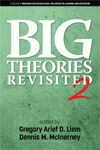
Big Theories Revisited 2
Edited by:
Gregory Arief D. Liem, Nanyang Technological University
Dennis M. McInerney, The Education University of Hong Kong
A volume in the series: Research on Sociocultural Influences on Motivation and Learning. Editor(s): Gregory Arief D. Liem, The Education University of Hong Kong.
Published 2018
Students’ school motivation and engagement are key contributors to the quality of their academic learning and performance, as well as growth in other important areas of life (social, emotional, and physical health). Fostering motivation and engagement is thus a meaningful educational purpose, both in and of itself and as a pathway to holistic student development. However, motivation and engagement do not develop in a vacuum, and effort seeking to facilitate them cannot be effectively pursued without understanding their underpinning sociocultural influences. In the first edition of this volume, “Big Theories Revisited” (McInerney & Van Etten, 2004), authors of major models of school motivation and engagement were ‘challenged’ to look into their theoretical work through a sociocultural lens. The volume has been well received as objectively reflected in the number of citations of its chapters.
Significant progress has since been made in the theorizing and research of ‘big theories’ of school motivation and engagement. In this volume, we invited a group of internationally-renowned scholars to re-examine their theoretical and conceptual work by highlighting the ‘what’ (factors) and ‘how’ (processes) of sociocultural influences in association with the key motivation and/or engagement construct(s) of their expertise. We made it clear to our contributors that we solicited new chapters rather than chapters with merely rehashed materials. As a result, this volume, “Big Theories Revisited 2” (Liem & McInerney, 2018) contains chapters that critically discuss sociocultural influences on school motivation and engagement constructs as viewed from focal theories including self-determination theory, achievement goal theory, personal investment theory, expectancy value theory, self-efficacy theory, self- and co-regulated learning models, and many others. Whereas some of the chapter topics covered in the initial edition are also part of this edition, some are new and provide fresh sociocultural angles on achievement-relevant processes and outcomes. Likewise, whereas some of the authors contributed to the earlier edition of the Volume, many of them are different. What appears to be the same across the two editions is the scholarly distinction of the authors and the substantive rigor of the chapters in advancing our current understanding of this field of enquiry. Readers will learn much from and be inspired by stimulating ideas presented in this volume.
CONTENTS
Sociocultural Perspectives on School Motivation, Engagement, and Achievement: Theory, Research, and Application. Gregory Arief D. Liem and Dennis M. McInerney. SECTION I: WHY AND WHAT DO I WANT TO ACHIEVE IN MY STUDIES? Sociocultural Influences on Student Motivation as Viewed Through the Lens of Self-Determination Theory, Johnmarshall Reeve, Richard M. Ryan, and Edward L. Deci. Sociocultural Influences on Achievement Goal Adoption and Regulation: A Goal Complex Perspective, Gregory Arief D. Liem and Andrew J. Elliot. Personal Investment Theory: A Cross-Cultural Framework for the Study of Student Motivation, Ronnel B. King, Jesus Alfonso D. Datu, and Dennis M. McInerney. SECTION II: HOW DO I THINK AND FEEL ABOUT MYSELF AND MY STUDIES? Expectancy-Value Theory in Cross-Cultural Perspective: What Have We Learned in the Last 15 Years? Stephen M. Tonks, Allan Wigfield, and Jacquelynne S. Eccles. Self-Efficacy in Education Revisited Through a Sociocultural Lens, Maria K. DiBenedetto and Dale H. Schunk. Sociocultural Influences on Self-Efficacy Development, Ellen L. Usher and Brianna L. Weidner. Control-Value Theory: A Social-Cognitive Approach to Achievement Emotions, Reinhard Pekrun. SECTION III: WHO WANTS ME TO STUDY WELL, AND WHO CAN I DO IT WITH? A Competence-in-Context Approach to Understanding Motivation at School, Kathryn Wentzel. Māori Students Flourishing in Education: High Teacher Expectations, Cultural Responsiveness and Family–School Partnerships, Christine M. Rubie-Davies, Melinda Webber, and Hana Turner. Cooperative Learning: Theoretical Foundations and Relevance Across Cultures, Amanda J. Inns and Robert E. Slavin. SECTION IV: HOW DO I REGULATE MY STUDIES, AND WHO CAN HELP ME DO IT? Integration of Socialization Influences and the Development of Self-Regulated Learning Skills: A Social-Cognitive Perspective, Timothy J. Cleary, Anastasia Kitsantas, Stephen Pape, and Jacqueline Slemp. Supporting Self-Regulation and Self-Determination in the Context of Music Education, Nancy E. Perry, Silvia Mazabel, Ben Dantzer, and Philip H. Winne. Co-Regulation: A Model for Classroom Research in a Vygotskian Perspective, Mary McCaslin and Christine Calderon Vriesema. Motivating Engaged Participation and Generative Learning in Fully Online Course Contexts, Daniel T. Hickey and Christopher D. Andrews. SECTION V: ARE MY PEERS AND I MORE ALIKE, OR DIFFERENT, IN OUR SCHOOL MOTIVATION AND LEARNING? The Need for Positive Feedback: Sociocultural Consideration of Self-Evaluative Motives in Education, Constantine Sedikides. Evolutionary Psychology and the Classroom: Implications for Theory, Research, and Practice in Motivation, Learning, Achievement, and Instruction, Andrew J. Martin. About the Contributors.
-
Paperback978-1-64113-268-8
Web price: $62.04 (Reg. 72.99)
-
Hardcover978-1-64113-269-5
Web price: $89.24 (Reg. 104.99)
- eBook978-1-64113-270-1

- EDU021000 - EDUCATION: Non-Formal Education
- EDU038000 - EDUCATION: Student Life & Student Affairs
- EDU051000 - EDUCATION: Learning Styles
-
 Flourishing in Contexts and Cultures
Sociocultural Perspectives on Fostering Youth Well-Being
Flourishing in Contexts and Cultures
Sociocultural Perspectives on Fostering Youth Well-Being
-
 Promoting Motivation and Learning in Contexts
Sociocultural Perspectives on Educational Interventions
Promoting Motivation and Learning in Contexts
Sociocultural Perspectives on Educational Interventions
-
 Sociocultural Theories of Learning and Motivation
Looking Back, Looking Forward
Sociocultural Theories of Learning and Motivation
Looking Back, Looking Forward
-
 Standards in Education
Standards in Education
-
 Student Perspectives on Assessment
What Students Can Tell Us About Assessment for Learning
Student Perspectives on Assessment
What Students Can Tell Us About Assessment for Learning
-
 Teaching and Learning
International Best Practice
Teaching and Learning
International Best Practice
-
 Understanding Developmental Disorders of Auditory Processing, Language and Literacy Across Languages
International Perspectives
Understanding Developmental Disorders of Auditory Processing, Language and Literacy Across Languages
International Perspectives

